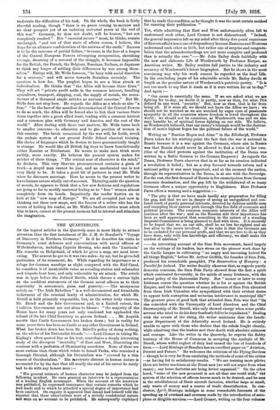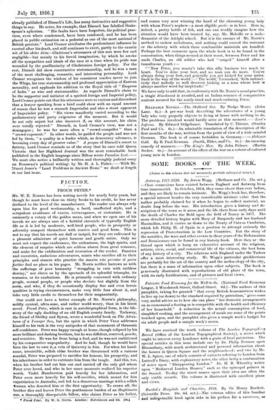THE QUARTERLIES.
Or the topical articles in the Quarterly none is more likely to attract attention than the first instalment of Mr. J. M. de Beaufort's " Voyage of Discovery in Northern Germany." In it he describes his visits to Germany's coast defences and conversations with naval officers at Wilhelmshaven, including Captain Hersing, who sank the Lusitania.' His remarks on Heligoland, of which he gives a map, are most inter- esting. The nearest he got to it was two miles—by air, but he gives full particulars of its armament, &o. While regarding its importance as a refuge for German warships as slight compared with the Kiel Canal, he considers it of incalculable value as a coaling-station and submarine and torpedo-boat base, and only vulnerable by air attack. The article was in type before the Jutland Battle, which throws a curious light on the confident statements of the German naval officers as to their superiority in armaments, guns, and gunnery.—The anonymous article on " The Irish Rebellion " is a well-documented and formidable indictment of the criminal laxity of administration, for which Mr. Birrell is held primarily responsible, but, as the writer truly observes, Mr. Birrell and the late Government and, to a limited extent, the Coalition Government are not alone to blame : " the majority of the House have for many years not only condoned but applauded the refusal of the late Chief Secretary to govern Ireland. . . . Mr. Asquith asserts that Castle Government has broken down ; but in reality for some years there has been no Castle or any Other Government- in Ireland. What has broken down has been Mr. Birrell's policy of doing nothing, on the advice of his Nationalist friends."—Lord Cromer in taking Mr. Kipling's often-quoted line as his text, contributes a deeply interesting study of the divergent " mentality " of East and West,_ illustrating the contrast with a profusion of illuminating anecdotes. None of these are more curious than those which relate to Ismail Pasha, who remained a thorough Oriental, although his Orientalism was " covered by a thin veneer of Occidentalism." His inveterate distrust in human nature is accounted for by the fact that till nearly the end of his career he rarely had to do with any honest man :—
" His general estimate of human character may be judged from the following incident. He once granted an interview to a representative of a leading English newspaper.. When the account of the interview was published, he expressed annoyance that certain remarks which he had made and to which he attached a special degree of importance had been omitted. On enquiry it appeared that Ismail had himself told the reporter that these observations were of a strictly confidential nature and were on no aecount to be published. He subsequently explained
that he made this condition as he thought it was the moat certain method for ensuring their publication. "
Yet, while admitting that East and West unfortunately often fail to understand each other, Lord Cromer is not disheartened. " Indeed, the general impression left on my mind after thirty-five years' experience of Eastern affairs is not one of despondency because Eastern and Westerns understand each other so little, but rather one of surprise and congratu- lation that the misunderstandings are not more complete and profound than is actually the case."-----Mr. Sohn Bailey deals faithfully with the new and elaborate Life of Wordsworth by Professor Harper, an American writer. Mr. Bailey renders full justice to the industry and accuracy of Wordsworth's latest biographer. But he shows in the moat convincing way why his work cannot be regarded as the final Life. In the concluding pages of his admirable article Mr. Bailey dwells at length on the peculiar nature of Wordsworth's patriotic poetry. "It is not too much to say that it readsas if it were written for at to-day." And again :—
" Our cause is essentially the same. If we are asked what we are fighting fOr to-day, no doubt it is partly, now as then, for what Pitt defined in one word, security.' Bat, now as then, that is far from being all. If it were all, we should not have the Allies we have ; we should not be watched as we are watched by eager eyes of passionate sympathy in all the countries where freedom is loved throughout the world ; we should not be conscious, as Wordsworth was and we also may humbly be, of spiritual forces fighting on our side. We believe, as Wordsworth believed, that our enemy's triumph would be the destruc- tion of men's highest hopes for the political future of the world."
Writing on " Russian Hopes and Alma" in the Edinburgh, Professor Pares takes for his starting-point the fact that the war is national in Russia because it is a war against the Germans, whose aim in Russia was that Russia should never be allowed to find a voice of her own. (One of the chief protests against the institution of the Dims, was written by a Baltic German to the German Emperor.) As regards the Drama, Professor Pares observes that in BO far as its creation indicated a revolution it failed ; but as a step forward towards reform and e national policy it was most important, and at the moment the nation, through its representatives in the Darns, is at one with the Sovereign. For the rest, the first demand of Russia is for emancipation from German economic) domination, and the gap left by the withdrawal of so many Germans offers a unique opportunity to Englishmen. Here Professor Pares offers a warning and a suggestion :— " The pity is that we have made hardly any preparation for filling the gap, and that we are in danger of seeing an unregulated and con- fused crush of purely personal interests, directed by dubious middle-men and trampling their narrow path through this fine field, of economic and political promise. The common economic interests of the Allies will continuo after the war ; and on the Russian side their importance has been so well appreciated that something in the nature of a standing Imperial Commission is-being planned to deal with them. • It is sincerely to be hoped that we, on our side, shall be no less far-sighted and no less alive to the issues involved. If we take it that the Germans are to be excluded for our personal profit, and that we are free to do as they have done, only with less knowledge and efficiency, we shall make the crudest of mistakes."
—An interesting account of the Sinn Fein movement, based largely on the writings of its leaders, lays stress on the pioneer work done by the Gaelic) League in cultivating " an angry and unceasing hatred fir all things English," before Mr. Arthur Griffith, the founder of Sinn Fein, produced his remarkable pamphlet, The Resurrection of Hungary : a Parallel for Ireland. The writer frankly observes that, as regards purely domestic concerns, the Sinn Fein Party showed from the first a spirit which contrasted favourably, in the minds of many Irishmen, with the actual policy of the Nationalist Party. But " sooner or later to every Irishman comes the question whether he is for or against the British Empire, and the frank treason of many adherents of Shin Fein alienated from them Irish Unionists who sympathized with their evident desire to oppose both corruption and sectarian intolerance in municipal life." The greatest piece of good luck that attended Sinn Fein was that "'its rise coincided with the Viceroyalty of Lord Aberdeen and the Chief Secretaryship of Mr. Birrell, who only showed energy when some public) servant who tried to do his dutyfearle,ssly fell to be repudiated." Dealing with the events of the rising, the writer maintains that the Intelli. gene Department of the Admiralty saved Ireland. He is entirety unable to agree with those who declare that the rebels fought oleanly, while admitting that the leaders met their death with absolute calmness and courage. Like the writer in the Quarterly, he regrets the flabby leniency of the House of Commons in accepting the apologia of Mr. Birrell, whoa*, wilful neglect of duty had caused the loss of hundreds of lives—Lord Montagu of Beaulieu has an excellent paper on " Aviation, Present and Future." He welcomes the criticism of the Flying Services —though he is very far from emulating the methods of some of the critics —as having led to satisfactory results. " We are training more pilots; there are better machines at the Front now (we will not argue from what cause) ; our home 'factories are being better organized." On the other hand, "some of the new personnel is not all that one could wish," thi system of the selection of officers leaves much to be desired, and he sees in tho establishment of State aircraft factories, whether large or small, only waste of money and a source of trade dissatisfaction. In con- clusionoLce'd Montagu indulges in some remarkable forecasts of the speeding up of overland end overseas mails by the introduction of aero- plane or dirigible services.—Lord Cromer, writing on the four volumes already published of Disraeli's Life, has many instructive and suggestive things to say. He notes, for example, that Disraeli has falsified Shake- speare's aphorism. " His faults have been forgotten, his political prac- tices, even where condemned, have been condoned, and he has been placed in public estimation on a pedestal as one of the most national of British patriots." Lord Cromer attributes the predominant influence he exerted after his death, and still continues to exert, partly to the caustio wit of his obiter dicta—Gladatone's utterances of this sort were few and negligible—but mainly to his fervid imagination, by which he awoke all the sympathies and ideals of the race at a time when its pride was wounded by the pusillanimity of Gladstonian foreign policy. For the rest, Disraeli did show constructive statesmanship, and he was a man of the most challenging, romantic, and interesting personality. Lord Cromer recognizes the wisdom of his consistent resolve never to join the Whigs, his true statesmanship and profound appreciation of Eastern mentality, and applauds his addition to the Royal title of " Empress of India " as wise and statesmanlike. As regards Disraeli's claim to be the supporter and initiator of a spirited foreign and Imperial policy, Lord Cromer points out that his utterances were so various and discordant that a lawyer speaking from a brief could show with an equal amount of reason that he was a staunch Imperialist and also a stout opponent of Imperialist policy. " His views manifestly varied according to the parliamentary and party exigencies of the moment. But it would be not only unjust but also incorrect if, on this account, his claim were totally rejected." Disraeli, in Lord Cromer's view, was not a demagogue ; he was far more often a " crowd-compeller " than a " crowd-exponent." In other words, he guided the people and was not led by them, " a quality in a leader which, as democracy advances, is becoming every day of greater value." A propoa of Disraeli's resort to flattery, Lord Cromer reminds us of the story that ho once told Queen Victoria that her Highland Journal was the most remarkable book published in the English language since Milton wrote Paradise Lost
We must also notice a brilliantly written and thoroughly judicial essay on Rousseau's political writings by Mr. H. A L Fisher.—With Mr. 8tuart Jones's "Land Problems in Ancient Rome" we dealt at length in our last issue.































 Previous page
Previous page